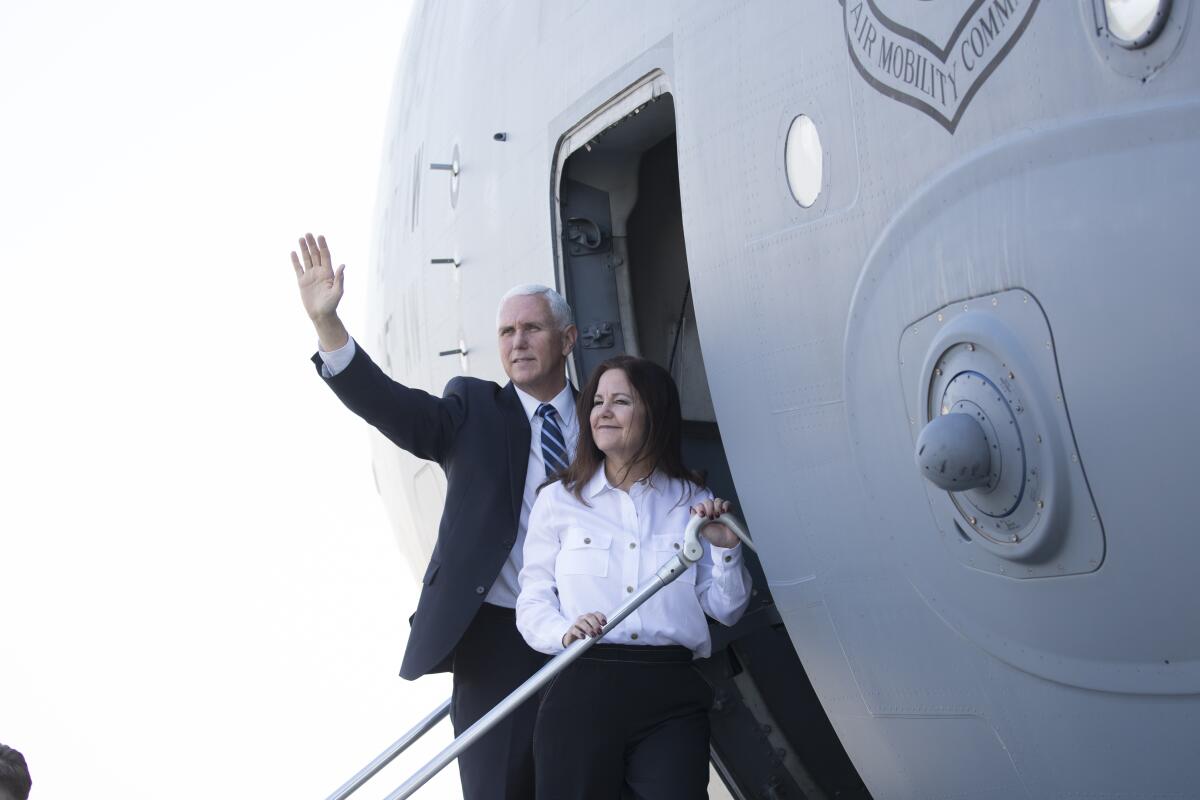Pence, in Iraq, works to reassure Kurds

- Share via
IRBIL, Iraq — Vice President Mike Pence made an unannounced visit to Iraq on Saturday in the highest-level American trip since President Trump ordered a pullback of U.S. forces in Syria two months ago.
Flying in a C-17 military cargo jet to preserve the secrecy of the visit to the conflict zone, Pence landed in Irbil to meet with Iraqi Kurdistan President Nechirvan Barzani. The visit was meant to reassure the U.S.’ Iraqi allies in the fight against the Islamic State group even though the U.S. pulled troops from northern Syria on Trump’s orders, leaving Kurdish allies in neighboring Syria to face a bloody Turkish assault last month.
Earlier, Pence received a classified briefing at Iraq’s Al-Asad Air Base, from which U.S. forces are believed to have launched the operation in Syria last month that resulted in the death of Islamic State leader Abu Bakr al-Baghdadi. Pence also spoke by phone with Iraqi Prime Minister Adel Abdul-Mahdi.
It was Pence’s second trip to the region in five weeks. Trump deployed him on a whirlwind trip to Ankara, Turkey, last month to negotiate a cease-fire after President Recep Tayyip Erdogan seized on the U.S. withdrawal to launch an assault on Kurdish fighters in northern Syria. Trump’s move had sparked some of the most unified criticism of his administration to date, as lawmakers in both parties accused the president of forsaking longtime Kurdish allies and inviting Russia and Iran to hold even greater sway in the volatile region.
Pence said he welcomed “the opportunity on behalf of President Donald Trump to reiterate the strong bonds forged in the fires of war between the people of the United States and the Kurdish people across this region.”
A senior U.S. official said Pence’s visit was meant both to reassure Iraqi Kurds who remain allied with the U.S. in the fight against the Islamic State group, as well as Americans who have long supported the Kurdish cause, that the Trump administration remained committed to the alliance. The visit was also designed to show Pence’s focus on foreign policy as Washington is gripped by the drama of impeachment.
Barzani thanked Pence for U.S. military support in the fight against Islamic State, adding that his “visit at this particular time is an important indication of your continued support to Kurdistan and Iraq.”
The U.S. maintains its collaboration with Iraqi Kurds, notwithstanding its pullout from northern Syria, where Trump, after declaring the near-complete withdrawal of U.S. forces, decided that roughly 800 would stay to keep oil fields in the east fields from falling back into Islamic State hands.
Trump also agreed to keep about 150 U.S. troops at a base in southern Syria as a check on Iranian influence in the region.
While Trump has claimed that the U.S. was now “keeping” the oil in Syria, Pentagon officials indicated the U.S. presence is not intended to improve the oil infrastructure but to keep it in the hands of the Kurdish-led Syrian Democratic Forces.
Pence said the U.S. and Kurdish alliance was meant to ensure that Islamic State or another extremist group “will not be able to gain a foothold in this region again.”
Pence, joined on the trip by his wife, Karen Pence, also greeted U.S. troops ahead of the Thanksgiving holiday, serving turkey and accompaniments to hundreds of troops at the two locations.
“While you come from the rest of us, you’re the best of us,” Pence told service members in a dusty hangar at Al-Asad. He said the Trump administration is working to secure another pay increase for the armed services and suggested the ongoing impeachment inquiry in Washington was slowing the way.
“Partisan politics and endless investigations have slowed things down in D.C.,” Pence said.
Pence’s visit to Iraq comes as the country has been plagued by widespread anti-corruption protests. At least 320 protesters have been killed and thousands have been wounded since the unrest began on Oct. 1, when demonstrators took to the streets in Baghdad and across Iraq’s mainly Shiite south to decry rampant government malfeasance and a lack of basic services despite Iraq’s oil wealth. The protests have exposed long-simmering resentment over Iran’s influence in the country, with protesters targeting Shiite political parties and militias with close ties to Tehran.
Pence spoke by phone with Abdul-Mahdi after the Iraqi leader declined an invitation to meet with Pence at the air base when security concerns prevented Pence from traveling into Baghdad. The U.S. ambassador to Iraq, Matthew Tueller, said Pence expressed support for a free, sovereign and independent Iraq — a subtle warning against Iranian influence in the country, which has weakened cooperation between the U.S. and Iraq.
Pence also encouraged the Iraqi government to show restraint with the protesters. According to one official, Abdul-Mahdi expressed regret for the violence and cast it as growing pains for the country and its security services, more used to war than democratic protest.
Pence’s visit comes days after the release of hundreds of pages of purported Iranian intelligence cables detailing Iran’s extensive influence in Iraq.
The unprecedented leak of 700 pages of documents shows Tehran’s efforts to embed itself in Iraq and co-opt the country’s leaders, including paying Iraqi agents working for the United States to switch sides and infiltrate every aspect of Iraq’s political, economic and religious life, according to a joint report by the New York Times and the Intercept.
The revelation came after dozens of demonstrators attacked the Iranian consulate in Karbala earlier in November, scaling concrete barriers and saying they rejected the influence of the neighboring country in Iraqi affairs.
More to Read
Get the L.A. Times Politics newsletter
Deeply reported insights into legislation, politics and policy from Sacramento, Washington and beyond. In your inbox twice per week.
You may occasionally receive promotional content from the Los Angeles Times.










